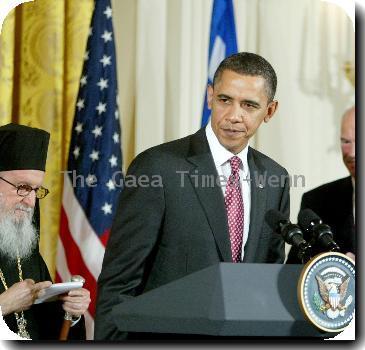US envoy: Climate bill may not be in place by Cancun summit, insists it’s not crucial to talks
By Alexandra Olson, APMonday, May 10, 2010
Envoy: US may have no climate bill by Cancun talks
MEXICO CITY — Washington’s special climate envoy conceded Monday the U.S. may not have a climate and energy bill in place when the next major global warming conference is held in Mexico late this year, but insisted the legislation is not crucial to those talks.
Efforts to pass the long-stalled bill hit another setback this month when its only Republican sponsor, Sen. Lindsay Graham of South Carolina, withdrew his support.
“I hope to get it this year. If we don’t get it this year, we’ll keep pressing to get it next year,” Todd Stern, President Barack Obama’s climate envoy, told reporters during a visit to Mexico.
Some environmental groups including Greenpeace say drafting a new global treaty on climate change will be difficult unless the U.S. has a climate law in place. The planned bill would aim to cut U.S. emissions of carbon dioxide and other greenhouse gases 17 percent below 2005 levels by 2020.
Mexico is hosting the next round of international climate negotiations in December in Cancun.
Graham said last week it would be impossible to pass the legislation now because of disagreements on immigration reform and on offshore drilling in the wake of the Gulf oil spill. The leading Senate sponsors, Democrat John Kerry of Massachusetts and independent Joe Lieberman of Connecticut, said they would press on anyway and introduce the bill Wednesday.
Since the Gulf of Mexico oil spill, some Democrats now oppose including an expansion of offshore drilling in the bill, a proposal thought to be crucial for winning Republican support.
Kerry and Lieberman had already delayed unveiling the bill after Graham threatened last month to withhold his support because he was angry that Democrats said they would take up a rewrite of immigration policy.
That puts Mexico in a potentially awkward situation.
President Felipe Calderon has worked to make Mexico a global leader on climate change and success in Cancun would be a major boost for his legacy. But Calderon has also vowed to push for progress on U.S. immigration reform when he visits Washington next week in the wake of Mexican anger over Arizona’s tough new immigration law.
Stern, however, said the potential impact of the immigration debate on the climate bill did not come up in his talks with top Mexican officials.
He insisted progress can be made in Cancun whether or not the U.S. climate change law has passed.
“Whether the legislation is done or not by the time of Cancun we will be working hard to get a good outcome there, and there is every reason to think if countries work together the right way there will be a good outcome,” Stern said. “So useful, yes, but a good outcome is obtainable one way or another.”
Like other climate officials, Stern stressed he does not necessarily expect a comprehensive international treaty to be finalized in Cancun. He said he would consider the talks a success if negotiators make considerable headway on tough issues like cutting greenhouse gases and creating a system of financial aid for poor countries.
Tags: Accidents, Barack Obama, Central America, Climate, Energy, Environmental Concerns, Environmental Laws And Regulations, Government Regulations, Industry Regulation, International Agreements, John Kerry, Latin America And Caribbean, Mexico, Mexico City, North America, United States

